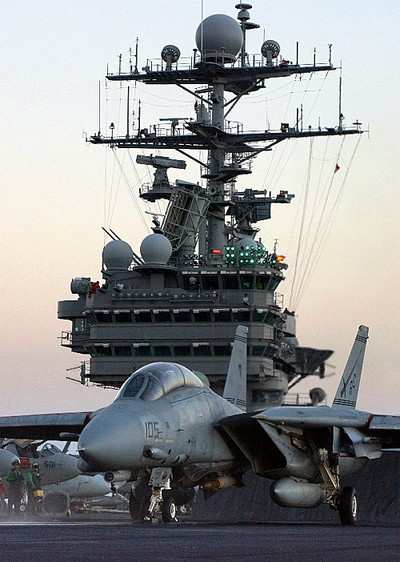Incident Raises Concern For Military Officials
Did it just get a bit chillier on the global stage? A weekend
incident in which a Russian bomber "buzzed" the Nimitz battle group
in the Pacific raises concerns about Russia's intent and the
message it was meant to send, the vice chairman of the Joint Chiefs
of Staff told Congress Tuesday.

Marine Gen. James E. Cartwright told the Senate Budget Committee
the encounter -- in which US F/A-18 jets scrambled to intercept a
Russian Tu-95 Bear bomber as it flew at 2,000 feet above the battle
group -- ended without incident, but raises big questions.
 US forces detected two
Russian Tu-95s early February 9 as they flew south of Japan, US
Pacific Fleet officials reported. The aircraft turned inbound
toward USS Nimitz, and Carrier Air Wing 11 aircraft were launched
to intercept them. Four F/A-18 fighter jets intercepted and
escorted the Russian aircraft until they left the Nimitz's
operating area, officials said.
US forces detected two
Russian Tu-95s early February 9 as they flew south of Japan, US
Pacific Fleet officials reported. The aircraft turned inbound
toward USS Nimitz, and Carrier Air Wing 11 aircraft were launched
to intercept them. Four F/A-18 fighter jets intercepted and
escorted the Russian aircraft until they left the Nimitz's
operating area, officials said.
In total, four Russian Tu-95 bombers were involved, a Navy
spokesman said. Two remained about 500 miles east of the US ships,
and another orbited about 50 miles away as one Tu-95 did two low
passes over the Nimitz carrier group, he said.
"Now what we are concerned about is, 'What are the indications
of this return to a Cold War mindset?'" Cartwright told the
committee in response to a senator's question. "What are the
implications of that activity, and how do we best address
that?"
Cartwright conceded that the incident occurred in international
airspace and "within the normal air structure," but he said it's
left defense officials questioning the rationale behind it. "What
message was intended by this overflight?" he said.
US jets scrambled after detecting the Russian bombers more than
500 miles out and escorted them as they turned and headed toward
home, Cartwright said. He said the actions were normal response to
such activities in international waters. "These are the standard
practices from our standpoint of intercept, escort, follow them
through, and then follow them until they are out of range of the
battle group's normal operations," he said.
The escort provided "both for safety of flight in the area and
for the potential protection that would be afforded by having an
escort along," he said.
Twenty-two Japanese jets also scrambled in response to the
incident, a Navy spokesman said. Japan has charged Russia with
violating Japanese airspace.
Cartwright said encounters like the one that occurred over the
weekend have happened before, but not recently. A Russian Bear
overflew USS Kitty Hawk in July 2004 as it operated in the Sea of
Japan, US Pacific Fleet officials said.

"We treat that as something that is unusual from the standpoint
that there has been a significant lapse in time since that last
occurred," Cartwright said. "But not significant is that the
practice was done safely, professionally and they were escorted out
of the area."
More recently, Russian Bears have become increasingly common in
the skies near NATO-aligned countries. As ANN reported, last year a
number of Bears were sighted near North America, the UK, Finland,
and Guam.
The Nimitz Carrier Strike Group entered the US 7th Fleet's area
of responsibility just one day before the incident to fill in while
USS Kitty Hawk undergoes scheduled maintenance in Japan. The 7th
Fleet, the largest of the forward-deployed US fleets, includes
about 50 ships, 120 aircraft and 20,000 sailors and Marines and is
operating in the Western Pacific and Indian oceans.
USS Nimitz arrived in Sasebo, Japan, February 11 for a scheduled
port visit. Its crew is participating in friendship-building and
goodwill-generating activities, as well as cultural exchanges, Navy
officials said.
(ANN thanks Donna Miles, American Forces Press Service, for
her report)
 ANN's Daily Aero-Linx (05.06.25)
ANN's Daily Aero-Linx (05.06.25) ANN's Daily Aero-Term (05.06.25): Ultrahigh Frequency (UHF)
ANN's Daily Aero-Term (05.06.25): Ultrahigh Frequency (UHF) ANN FAQ: Q&A 101
ANN FAQ: Q&A 101 Classic Aero-TV: Virtual Reality Painting--PPG Leverages Technology for Training
Classic Aero-TV: Virtual Reality Painting--PPG Leverages Technology for Training Airborne 05.02.25: Joby Crewed Milestone, Diamond Club, Canadian Pilot Insurance
Airborne 05.02.25: Joby Crewed Milestone, Diamond Club, Canadian Pilot Insurance





